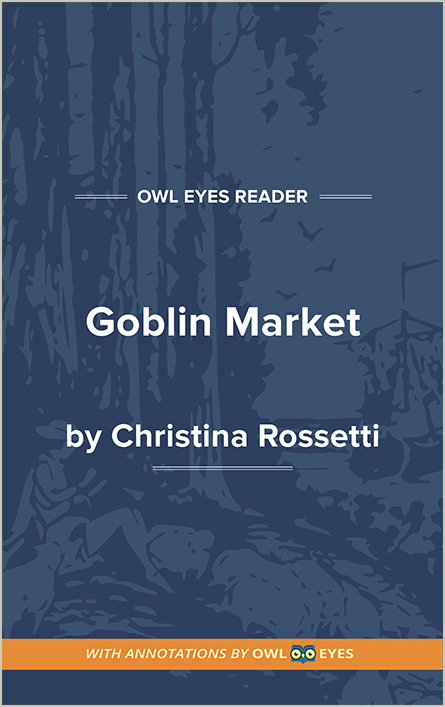Study Guide
Analysis Pages
Summary
“Goblin Market,” which appeared in Christina Rossetti’s first published collection of poetry, is unquestionably her most original poem and stands out as a masterwork of aesthetic taste. Rossetti’s ties with her brother Dante’s Pre-Raphaelite Brotherhood (she contributed verses to their short-lived magazine, Germ) also explain why the anthology has been labeled the movement’s first literary success. It was Dante, furthermore, who suggested the title, having written a poem himself about the market of fallen girls. “Goblin Market,” however, differs notably from her other poetic work, which possesses a depth and a Victorian pathos all its own, principally in its alluring singsong quality and pervasive sexuality.
That Rossetti could have been unaware of the intense sexual imagery of “Goblin Market” seems unlikely, although in a note to the poem, her brother William Michael (who edited most of her poetry) speaks of her insistence that nothing “profound” had been intended. It is far more feasible to see her apparent obsession with certain images in the poem as suggestive of a more religious interpretation, one in which the goblins may be seen as maliciously evil creatures who have set out to beguile—and then seduce—the two girls. In this respect, the poem does bear a resemblance to Rossetti’s major poetic themes, which are heavily laden with introspection, suffering, and otherworldly love.
Dedicated to Rossetti’s sister Maria, “Goblin Market” deals with two sisters, Laura and Lizzie, who, while on their usual way to a brook to fetch water, hear goblins hawking their wares, the goblin fruits. Lizzie warns Laura not to listen to them and flees, knowing that their sister Jeanie, who had eaten of the goblin fruit, had languished to her death. Laura, however, is thoroughly enticed by the goblins and buys their luscious fruit, paying them with a lock of her golden hair, as she has no coins. Shortly afterward, she begins to undergo the same transformation that Jeanie did, her hair growing thin and gray, and, almost inexplicably, she can no longer hear the goblin men’s cries, though she yearns passionately for their figs and plums.
The strong-willed Lizzie, in a desperate attempt to save her sister, returns to the goblin men that only she can now hear and offers to buy their fruit, although she adamantly refuses to join them at their feast. After bravely resisting the evil creatures’ attacks, during which her mouth and face are smeared with fruit juices, Lizzie makes her way home. Greeted by Laura, she invites her sister to partake of the restorative juices she knows will cure her:
Hug me, kiss me, suck my juicesSqueezed from goblin fruits for you,Goblin pulp and goblin dew.Eat me, drink me, love me;Laura, make much of me.
After Laura does as she is asked, Lizzie spends the night tending to her, holding water to her lips and cooling her face. When dawn comes, Laura has been restored to her former self, her hair once again gleaming and golden. Later, when the grown girls have become wives and mothers, they tell the story to their own children, exhorting them to cling together: “For there is no friend like a sister,/ In calm or stormy weather . . . .” Quite clearly, the main themes of the poem revolve around temptation and seduction as well as individual sacrifice and its saving grace. In a moral sense, which is perhaps the best of interpretive modes, the poem is very similar to those of Samuel Taylor Coleridge (and those of the French poet Paul Verlaine, in its nuances and musical cadence), evoking in the mind of the reader a wealth of pictorial images, a strong sense of the magical, and an almost spellbinding musical quality. There is no doubt that the language is captivatingly sensuous, almost shamelessly so, as can readily be seen from such lines as “She sucked and sucked and sucked the more/ Fruits which that unknown orchard bore.”
It is a unique trait of the poem that, even beyond its moral...
(The entire page is 2,074 words.)
Owl Eyes subscribers get unlimited access to our expert annotations, analyses, and study guides on your favorite texts. Master the classics for less than $5/month!

